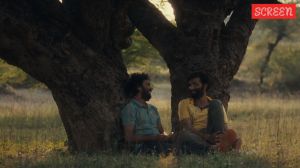‘No smoking guns, but documents worrying’
Top UN arms inspector Hans Blix said on Sunday that the discovery of documents at the home of an Iraqi scientist was worrying and questioned...

Top UN arms inspector Hans Blix said on Sunday that the discovery of documents at the home of an Iraqi scientist was worrying and questioned if more such key documents were hidden.
Blix, who left Cyprus for Iraq with UN nuclear agency Chief Mohamed el Baradei later on Sunday on a last-ditch bid to get Iraq’s full cooperation. Blix said Iraq had to declare and give access to all its documents.
|
Chief UN inspectors report progress in Iraq talks
|
||
|
Baghdad: In a last-ditch bid to get Iraq’s full cooperation, Chief UN weapons inspector Hans Blix and Mohamed el Baradei held talks with President Saddam Hussein’s scientific advisor Amir al-Saadi and the head of Iraq’s National Monitoring Directorate General hussam Mohammad Amin. ‘‘We are having good constructive meetings. We are going to meet again tomorrow. We are making progress,’’ el Baradei said without elaborating. Blix said that it was in Iraq’s power to avert war, ‘‘and it requires very active Iraqi cooperation,’’ he said. — Reuters |
‘‘Iraq has an obligation to give a full declaration so they (documents) should have been given. Why are they still there? Are there more?,’’ Blix said.
‘‘These are not weapons of mass destruction. Documents are not WMD. Shells are not. But they are a sign that all has not been declared and that is worrying.’’ ‘‘The things that have happened in the last few days are a bit troubling,’’ he added.
Blix and Baradei said on Saturday they would get tough with Iraq to come clean over any weapons of mass destruction, as the protests underlined growing anxiety across the world at the prospect of war in the oil-rich Gulf region.
Baradei voiced frustration with Iraq after inspectors raided the scientist’s house and found 3,000 pages of material related to enrichment of uranium that could be used for nuclear weapons.
‘‘Iraq should be pro-active. We shouldn’t have to find these on our own,’’ he said. The two days of talks that Blix and Baradei hold in Baghdad could be key to a major report they are due to present to the UN Security Council on January 27.
The inspectors say they have found no ‘‘smoking guns’’, nor hard evidence, in eight weeks of searches so far, but Washington has said any Iraqi failure to answer key questions could trigger war. Iraq denies it has banned weapons.
Blix has played down the find’s significance, but he and el Baradei say they want both more cooperation and answers to a ‘‘great many questions’’ left unanswered by Iraq’s weapons declaration to the UN in December. Saddam, who maintains that his country has no banned weapons, hailed the anti-war demonstrations.
‘‘They are supporting you because they know that evil-doers target Iraq to silence any dissenting voice to their evil and destructive policies,’’ Saddam told senior military officers.
El Baradei said the discovery of the documents in the Iraqi scientist’s house on Thursday underlined the need for Iraq to provide clear evidence to back up its stance that it has no chemical, biological or nuclear weapons or long-range missiles.
‘‘Why should these documents be in a private home? Why are they not giving them to us?’’ he said. The scientist, Faleh Hassan, accused the inspectors of ‘‘Mafia-like’’ behaviour and said they had tried to use his wife’s illness to persuade him to leave Iraq to be questioned.
Iraq says it destroyed anything that would have breached UN resolutions on banned weapons before inspectors returned last November after a four-year break. (Reuters)
Photos


- 01
- 02
- 03
- 04
- 05





























